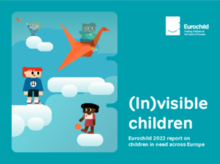This report highlights the recommendations and priorities that EU decision-makers and national governments can do to support the most vulnerable children and prevent widening inequalities.
Based on input from Eurochild national members from 22 countries across Europe, the report provides feedback on the 2022 European Semester Country Reports and Country Specific Recommendations; the development of the Child Guarantee National Action Plans and further analysis of the situation regarding child poverty and social exclusion; and members’ knowledge and experiences of EU funding programmes.
Eurochild Country Reports at a glance:
- European Semester
Many European Semester Country Reports and Country Specific Recommendations featured in this report briefly mention children, referencing measures that will indirectly or to some extent affect them (eg. child poverty, education, early childhood education and care). In most cases, education is referred to in the context of its labour market value and concrete measures referring to children are limited to the National Recovery and Resilience Plans. Only two country reports (Ireland and Poland) seem to offer more of a comprehensive picture. Overall, children’s rights and their needs are not sufficiently embedded in either document.
- Child Guarantee National Action Plans
12 countries included in this report have published their NAP. From these, our members reported that 8 involved children in the drafting and 16 involved civil society. However, some members in at least 4 countries (Latvia, Italia, Malta, and the Netherlands) expressed concerns over the lack of transparency of the stakeholder engagement process. Only one country (Estonia) has referred to their involvement as a good practice of co-design of the NAP at the time of drafting.
- EU Funding
In 16 countries featured in this report, members are aware of EU funding, but the majority has expressed that civil society is not being involved in the programming. Moreover, members in at least 6 countries have identified barriers to accessing EU funding regarding information accessibility and technical capacity.

